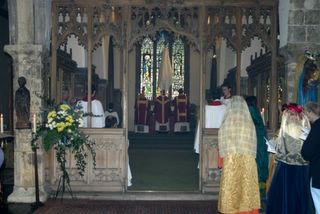
Mass for the Feast of Corpus Christi according to the Use of York at All Saints', North Street.
Was anybody at this?
It was a wonderful occasion. I was one of the taperers. My feelings were a curious combination of fun at being part of the reconstruction and awe at worshipping in a way that people did on that very site so many centuries ago. I had confirmed many of my suspicions that much of what we, as Anglicans, have in The Book of Common Prayer has its roots in the pre-reformation variants of the Roman Rite that were used in England.
This got me thinking about The Use of Sarum in WRO and some of the animosity towards it. I know that one of the main objections is that Sarum is not a living rite, but has had to be reconstituted - it is new. I am not sure that I agree. Having seen the York Mass done as it ought to be, I see it more as a restoration of the elements of the rite that were stripped away to leave what we have in the BCP - but the basic elements of those rites, with their spirituality, ceremonial and beauty, are still alive in the Prayer Book. Therefore a use of these rites would be a return to the fullness of Faith that was expressed in the rites of England before the schism and protestant reformation of the west, and not an invention of something new.
Now I know that Sarum, in its mediaeval form, is not pre-schism, as there were accretions, but it was certainly built on the Western Rite as it was before the schism. Was this the Rite of S. Gregory the Great? I just feel that to snub these rites in favour of the other wonderful liturgies that the Church has to offer would be to lose one of the few surviving elements of the riches of Orthodoxy in the west, and this would be a sore shame.
Wish I could have been there - was it videotaped?
ReplyDeleteDear Aritibule,
ReplyDeleteThanks for adding a comment. Yes, it was videotaped, although my copies, which are on disc, have become corrupt. I shall try to get some new ones from the organiser and see if I can get those posted online somewhere.
There is another such Mass planned for this summer. It shall be somewhere in Norfolk, the Saturday after the Assumption for the Feast of the Assumption. I believe that this will be according to the Sarum Use. I shall add more details when I know more.
In Christ,
Michael.
Michael – I'm not aware of much "animosity" towards the idea of Sarum customs within WRO. But I think that any plans to revive Sarum, in whole or in part, would have to have a firm pastoral rationale supporting it. In other words, are we restoring something because it will be genuinely useful in terms of bringing real people and communities into the Church, or are we simply doing "liturgical archaeology"?
ReplyDeleteI know that ROCOR has already blessed certain parishes to the Sarum Use, although I take the point that you are making.
ReplyDeleteAlthough I can see how it could be seen as a dead rite, I'm not sure that it is. The ceremonial, for example, that accompanies the prayer book rite, especially following the directions of Percy Dearmer, and which is alive in many parishes of the Church of England, is taken almost directly from Sarum, albeit a simplified version.
When I got my copy of the Sarum Missal, I was surprised to see how much of Anglican liturgy has its roots there. The preparation before Mass in Common Worship, the Collect for Purity, the second collect of Evensong (which is the Sarum collect in the Mass for peace) - all of these, which Anglicans repeat faithfully week by week, day by day, without the need for recourse to a printed copy, have their roots in Sarum.
Even some of the more ridiculous aspects of the Sarum Rite have been preserved, the Eucharistic Preface for the Feast of the Most Holy Trinity being a case in point. It is more a theological essay about the Trinity than a prayer addressed to God, much in the style of the Athanasian Creed. Reading ot, one could be forgiven for thinking that God were suffering from some identity crisis, yet it has been adopted for the Church of England's new liturgies, of which the Eucharist rather closely follows the order of the traditional Western liturgy - more so than the BCP did. This would be the ideal liturgy for Anglican convert communities for all of these reasons, in addition to the points that I made in my original post.
Gosh! I've just re-read all of that and realise just how much I actually support this idea.